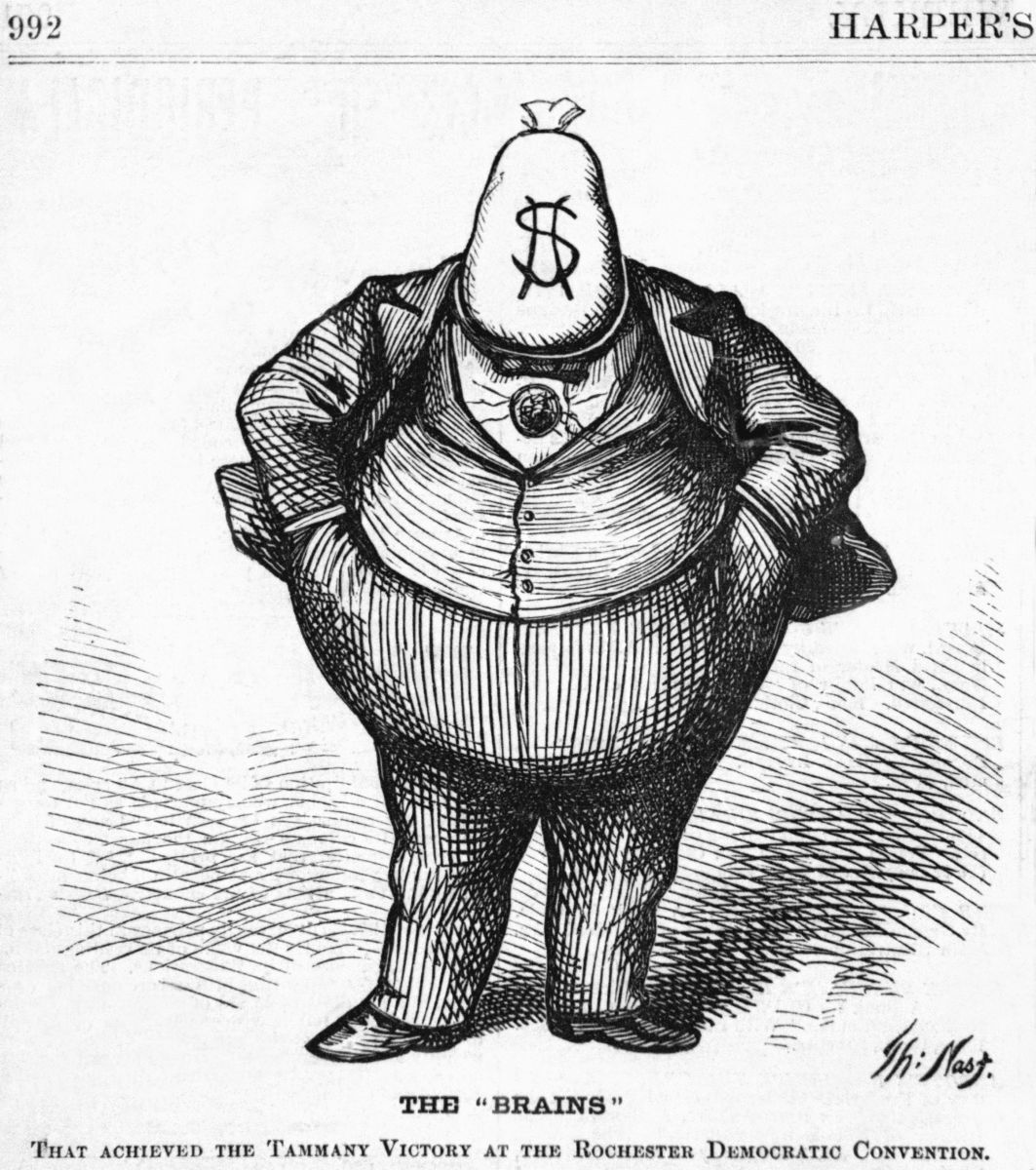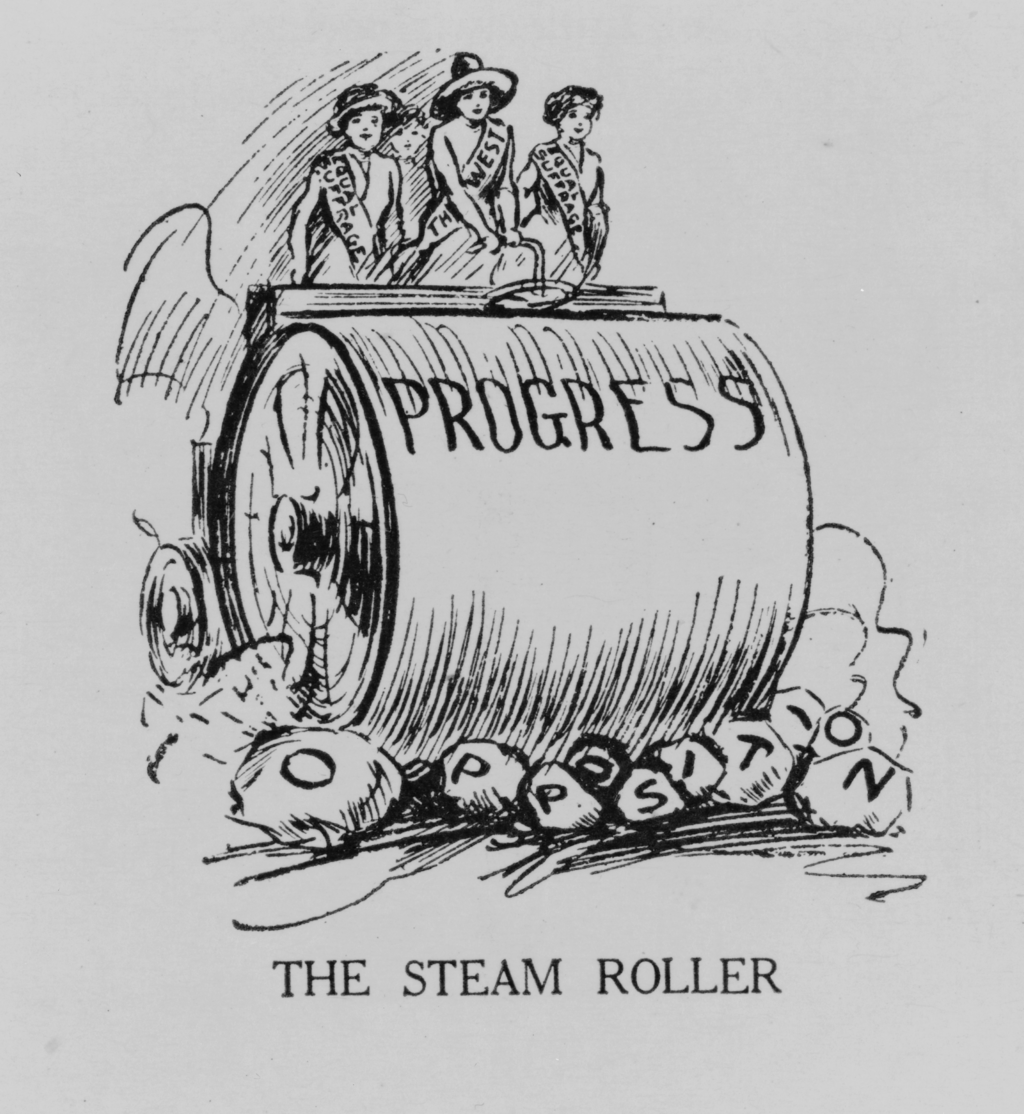
A man with a Make America Great Again Trump hat watches the proceedings from the Republican seating area at the annual Fancy Farm Picnic in Fancy Farm, Kentucky, on Aug. 6, 2016. (Photo By Bill Clark/CQ Roll Call)

The “Brains” that achieved the Tammany victory at the Rochester Democratic Convention, 1871. (Woodcut by Thomas Nast)
As Democrats debate whether they should adapt some slogan snappier than “A Better Deal” to woo voters in next year’s elections, I offer one to the Republicans, based on recent legislative announcements, that should cleverly appeal to both forward-looking and conservative thinkers alike, to wit, FORWARD TO YESTERYEAR!
Alas, it’s no laughing matter.
On Aug. 2, President Trump announced two new initiatives to advance his campaign to “make America great again” without any clear message of exactly what he means. But if you look closely, they go a long way toward clarifying a couple of his intentions.
One was the repeal and replacement of the Immigration Act of 1965, which itself replaced earlier laws of the 1920s. Those had set racial and ethnic quotas to limit the entry of so-called racially “inferior” post-Civil War immigrants from Southern and Eastern Europe. They also banned immigration from Asian countries entirely, completing a process begun with the Chinese Exclusion Act of 1882 on the grounds that both these groups brought crime and disease in their wake and undercut the wages of American workers.
The 1965 legislation abandoned such restrictions entirely and replaced them with a system based on uniting families and encouraging immigrants with special artistic or scientific talent.
Trump’s new proposal would be “merit-based” and award points to those with literacy in English, advanced education, lucrative job offers waiting or, of course, existing capital. What’s more, the overall numbers of immigrants admitted would be slashed almost in half. The huddled masses would stay huddled in their refugee camps and slums. Back we would go to the “safety” of 1925.
Trump’s other new initiative is the creation of a special unit in the Department of Justice to investigate “anti-white” discrimination. This is a tactic to pump new life into the long campaign by conservatives to undo desegregation measures mandated in the civil rights laws of the ‘60s, which guarantee equal opportunities in hiring and college admissions to African-Americans.
Coupled with the ongoing assault on voting rights that primarily would disenfranchise low-income and especially black voters on the phony grounds of preventing nonexistent election frauds, they make it plain that the reel of Trumpian “reforms” always spins backward.

Consider the evidence. First came the attack on the programs of the Great Society, including such programs as Medicare and Medicaid, as well as deep cuts in programs for early education, nutrition, mass transportation and urban renewal. Creation of some agencies now under attack, like the EPA and OSHA were even signed by Richard Nixon, however reluctantly, after LBJ had left office. Those two agencies will be gelded by leadership dedicated to their destruction, the goal of Trump’s alt-brain, Steve Bannon. The concept seems to be to cleanse the nation of any trace of progressive policy injected into society since LBJ left office. Away with them, then tackle their origins which go back to Franklin Roosevelt’s New Deal reforms. We will once again enjoy America when it was truly great, in 1929 just before the speculations of the rich plunged us into the Great Depression.
I remember the passion of reactionaries to repeal the New Deal, because I was living through the 1930s as a teenager. Efforts to create what we now call the liberal welfare state were despised and assailed by the “economic royalists” who hated FDR and whose hatred he “welcomed.” Small wonder. To fight the Depression and the power of Wall Street to bring on another, the New Deal dissolved monopolies, regulated banks and the stock market to curb runaway speculation, enabled workers to organize in unions, created beautiful and useful public works built by unemployed Americans earning public salaries, increased public housing, restored drought-stricken areas of the public domain with conservation measures carried out by a peaceful “army” of jobless youths, and brought electricity to rural America, among other successes.
Today, the heirs of those same economic royalists are back in the saddle, with a program that is nothing less than the erasure not only of the “Roosevelt Revolution” but of the entire list of achievements of the Progressive movement dating back to the 1880s. Their primary weapon is the revival of a 1944 “Bible” of government-hating libertarians, Friedrich Hayek’s The Road to Serfdom. No bad idea ever really dies, and with Trump’s ascendency and Republican control of all three branches of government, this one got a robust new lease on life.
Hayek’s basic argument was that government intervention in the workings of the free market meant giving power to officials to regulate economic behavior, such as telling a businessman at what price he could sell his product, could lead to a radical expansion of authority eventually reaching every corner of life — in essence to wipe out freedom entirely and to slide down the slippery slope to Fascism. Though Hayek did allow for the government to step in on occasion to curb a visible abuse, his more ardent followers spent most of their time and energy emphasizing the threat to liberty in abandoning market principles.
It was no coincidence that at the beginning of the Reagan era in 1980 Milton and Rose Friedman’s book Free to Choose became a best-seller and the subject of a television series — on PBS, of all places. Hayek died in 1992. In 2008 Jonah Goldberg published Liberal Fascism, which argues that progressives had created an “administrative state” run by an elite of liberal economists who practiced “social engineering,” which, among other indignities, contemptuously trampled on the natural and God-given rights of intelligent workers to “freely” contract with employers for jobs that in reality paid less than a living wage in return for exhausting, dehumanizing hours of work. It’s a position that gives new meaning and power to the word “reactionary.”
Hayek’s book enjoyed a new and enlarged audience in 2010, when Glenn Beck made it the subject of a set of TV interviews. A recent request I made for “articles citing Friedrich Hayek appearing in 2017″ yielded more than 700 articles. I have just recently read the 2016 Illiberal Reformers by Thomas Leonard, which contends that “modern liberalism permanently discarded economic liberties” and likewise got around to “trampling on individual rights to person, to free expression, to marriage and to reproduction.”
Whether Trump truly believes in this exaggerated “government is the enemy” doctrine can’t be said for sure. The man doesn’t appear to think; he only reacts to challenges to his inflated opinion of himself. But he does not seem uncomfortable about returning us to a pre-progressive era in which unions struggled to be born, bloody strikes were crushed by troops, small children worked long hours in dangerous trades, the Senate was a millionaire’s club elected by corrupt state legislatures instead of directly by the vote of the people, consumers risked being poisoned by patent medicines or tainted foodstuffs, and prices were rigged.
Trump’s race to consign every evidence of past progress to the “memory hole” of history, where they can be forgotten and replaced with state lies and alternate reality as defined by the maximum leader, is poison directed at the heart of democracy. It shouts for resistance in every medium and in every form — now. There may not be a second chance.
So, historians, to the barricades!
This post is part of a three-part series in which historians examine Donald Trump’s plans to “Make America Great Again” and consider what point in American history President Trump was thinking about when he said “again.” Clearly, different voters heard different things. Now that we’re more than six months into his presidency, these historians review his legislation and policies and explain where that might place us in the past. Read other posts in the series.

